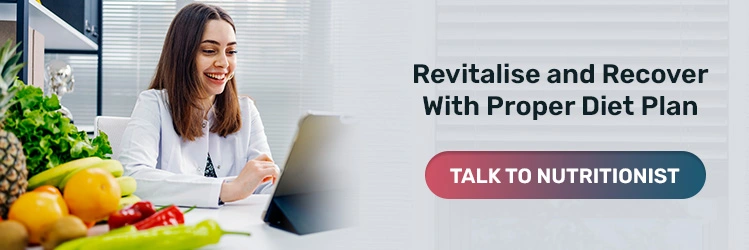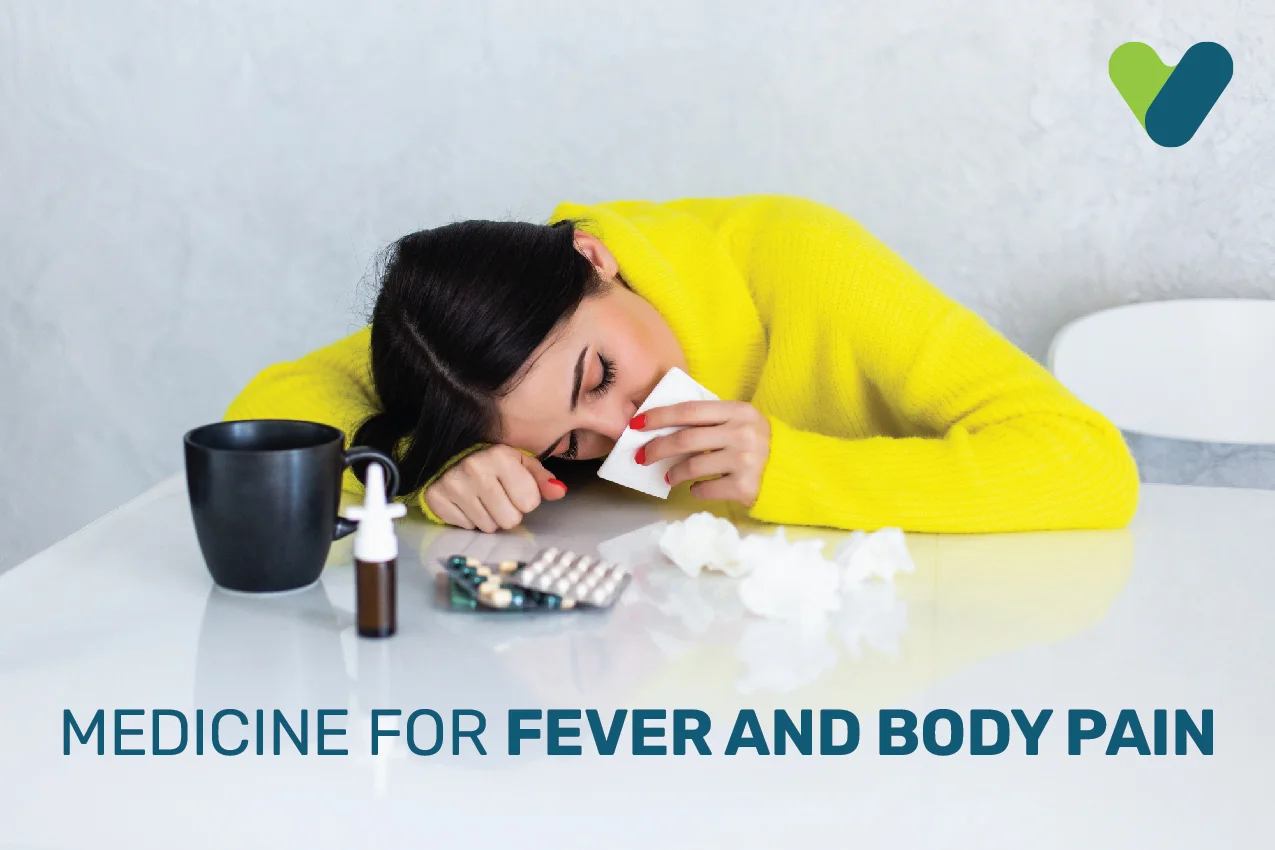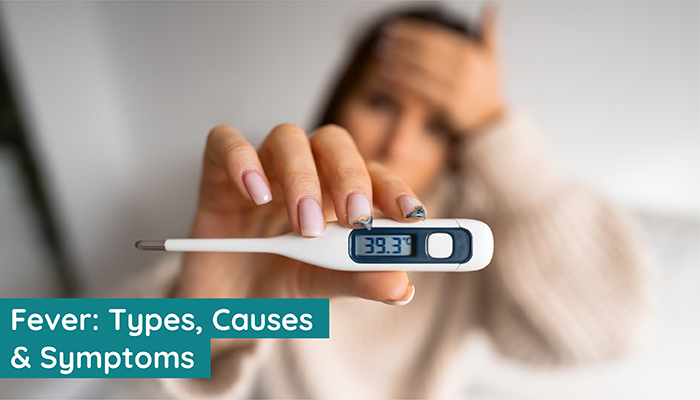When you have a fever, you lose body fluids through sweating. The rate of burning calories also increases to help your immune system fight the infection. You must compensate for the lost fluids and take measures to ensure proper physical functioning. While you may feel weak and unable to eat, you need to ensure you consume enough calories so that your body can recover from the fever quickly. A nutrient-rich diet during fever goes a long way in helping you recover when you are under the weather. You can include several easy-to-digest food during fever to stimulate your appetite. Knowing what food to eat during fever helps you plan your meals better.
Nutrient-Rich Foods to Eat During Fever
If you are wondering what food to eat during fever, here is a list of some food items and fluid sources that must be consumed during fever.
- Chicken Soup Chicken is a good source of minerals, vitamins, calories, and protein. It is the best food to eat during fever. Hence, chicken soup is a healthy option to add to your food during fever diet. The soup also replenishes the lost fluids and gives a boost of electrolytes in the body, which you would have lost due to dehydration.
- Legumes are packed with minerals like zinc, iron, and folate. They are the best vegetarian food to eat during fever and cough. They play an important role in boosting the immune system and speeding up your recovery. You can incorporate legumes into your diet in different ways such as a legume curry with beans, lentils, peas, and other pulses. Ensure you cook the curries without spices. For instance, you can blend legumes with rice, making for the ideal comfort food during fever and cough.
- Ginger A well-known remedy for infections, ginger contains active compounds that support your well-being. Besides targeting the bacteria or virus causing the fever, it also helps in relieving the symptoms of nausea and vomiting. You can brew ginger tea or use it in making broths or soup to restore your body temperature to normal. It can be an effective food to eat during fever and cough due to its soothing properties.
- Garlic: Garlic contains allicin, a compound comprising antibacterial properties. Allicin helps in fighting infection and, if included in food during fever, assists with speedy recovery. Garlic also has antifungal and antiviral effects that enhance the function of the immune system regardless of the cause. Adding it to your meals boosts flavour and effectively controls fever symptoms. Many find it useful when searching for what food to eat during fever.
- Curd Rice: Curd or yoghurt contains prebiotics, which are good bacteria that help in enhancing gut health. Combining it with rice helps you get the necessary fibre intake in your diet without much effort. Like lentils, curd rice also serves as comfort food you can eat despite a poor appetite. While it helps feel better during a fever, you should avoid curd if you have cold symptoms like sore throat and coughing as it thickens mucus. This is something you can keep in mind when looking for food to eat during fever and cough.
- Fruits Fruits are good sources of Vitamin C, an antioxidant that helps reduce fever symptoms. They also contain 80% water which provide your body meet the necessary fluids required and reduce dehydration. Some fruits to eat during fever are oranges, berries, apples, kiwi, grapefruits, watermelon, etc. You can consume fruits as is or make smoothies or juice to consume large quantities easily. Fresh fruits are often recommended as food to eat during fever and cough, especially because they are relatively light on the stomach and highly nutritious.
- Cooked Vegetables Vegetables like carrots, potatoes, beetroot, cauliflower, etc., are good sources of multi-nutrients like vitamins and minerals. You can consider adding them to your diet while selecting food to eat during fever. Vegetables also help support the immune system. That said, you should avoid eating raw vegetables as they are hard to digest and may cause bloating.
- Leafy Greens You can benefit from plant-based nutrients of leafy green vegetables like spinach, cabbage, broccoli, lettuce, etc. They are rich in vitamin E, vitamin C, vitamin K, folate, etc., which helps in reducing inflammation and infection. Cruciferous leafy green vegetables also contain high amounts of iron and proteins which prove helpful during fever. Leafy greens can be a nutritious food to eat during fever and cough.
- Boiled Eggs A significant symptom of fever is weakness. You can get rid of it easily with a healthy breakfast that contains boiled eggs. If you do not feel like overloading, you can avoid the egg yolk and consume egg whites alone, and you can still get the protein and strength to cope with the fever.
- Coconut Water If your condition worsens during fever, you may experience vomiting, diarrhoea, and excessive sweating. As a result, you stand to lose essential electrolytes that move nutrients into the cells. Drinking coconut water can replenish those lost electrolytes, making it a beneficial food to eat during fever and cough.
- Oatmeal Oats contain a soluble fibre called beta-gluten, which improves gut health and helps with digestion. Oats are one of the tasty foods to eat during fever. It also boosts the immune system with nutrients like copper and iron. You can add flavor to the bland oatmeal by adding honey and walnuts, which also contain healthy nutrients. When deciding what food to eat during fever, oatmeal is a gentle and nourishing option.
- Nuts and Seeds Nuts and seeds are also among the best food to eat during fever as they are packed with nutrients. You can eat almonds, cashews, walnuts, flaxseeds, etc., between meals. Nuts are also excellent sources of vitamin E and zinc, which are necessary for regulating the immune system. They are a great option when looking for a food to eat during fever and cough, especially since they boost energy naturally.
Food & Beverages to Avoid in a Fever Diet
Here are some items you should not include in your fever diet when deciding what food to eat during fever.
- Caffeinated and Carbonated Drinks: You must stay hydrated when you have a fever to make up for the loss of fluids. But while doing so, choose your drinks wisely. Caffeine stimulates fever-producing hormones, and carbonated beverages like soda and diet cola contain excessive sugar, which interferes with digestion. Caffeinated and carbonated drinks are not ideal food during fever.
- Processed Meat Processed meat is generally unhealthy. It contains harmful chemicals that affect your physical well-being negatively. When consumed during fever, you may experience worsened symptoms due to the high fat content in processed meat. Hence, it is best to avoid cold cuts, sausages, readily available minced meat, etc., in your food during a fever.
- Sugary Food Items While you may want comfort food to eat during fever, stirring clear of sugary food items is critical. These items do not contain any beneficial nutrients. On the contrary, they inflame your stomach lining and negatively affect the natural immune response in your body. If you’re ensure of what food to eat during fever when it comes to added sugar, avoid sugary foods entirely.
- Fried Food Maintaining proper digestive function is extremely important to recover quickly when you are down with a fever. Consumption of fried food items like chips, crackers, fries, etc., hinders the recovery process as these items are hard to break down and hard on the gastrointestinal system. Fried foods are never recommended as safe food to eat during fever and cough.
- Food With Preservatives Readymade and packaged food items contain artificial colours and flavours and are loaded with preservatives. Eating them reduces your recovery process when you have a fever. You should avoid such food items altogether and focus on home-cooked meals to feel better. Foods with preservatives definitely do not qualify as safe food during fever.
Fibre-rich Grains While fibre-rich grains are generally healthy, they are not the ideal food to eat during fever. They irritate the stomach and complicate the already-weak digestive system when you are unwell. Hence, you should avoid the consumption of whole wheat grains, corn, chickpeas, etc., when you are down with fever. So, when you’re planning what food to eat during fever, opt for something that is easy on your stomach.



